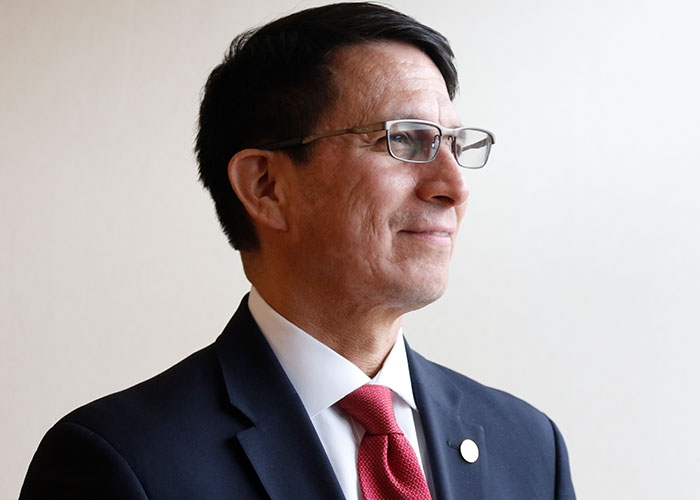Exit Interview: RIC’s 10th President Looks Back on His Six Years in Office
- News & Events
- News
- Exit Interview: RIC’s 10th President Looks Back on His Six Years in Office
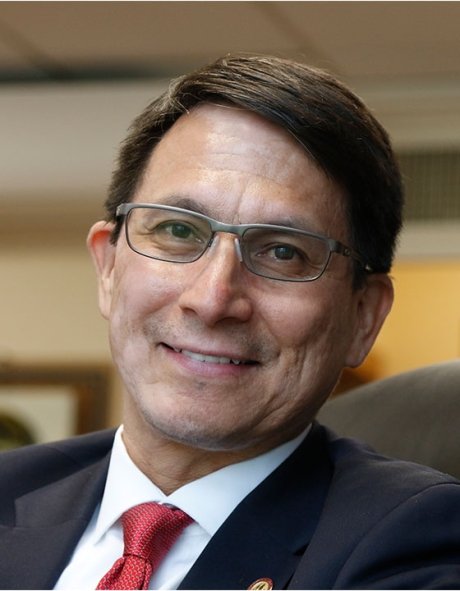
Outgoing President Frank D. Sánchez reflects on his time in office and weighs in on questions of RIC’s future.
Ultimately, history and time determine how a president will be remembered. But one aspect of the presidency of Frank D. Sánchez is undeniable. When he took office on July 1, 2016, he became the first president of color in the college’s history, and when he ended his presidency on July 1, 2022, he handed over a college that is far more diverse than it’s ever been in its history.
Sánchez arrived with an ambitious agenda of change. He was a leader with great vision and an extraordinary capacity to ignite the imagination of the campus community. “The future of Rhode Island College is not just bright. It’s brilliant,” he said during his inaugural speech. “We are the brave ones, the ones willing to step forward when others shy away.”
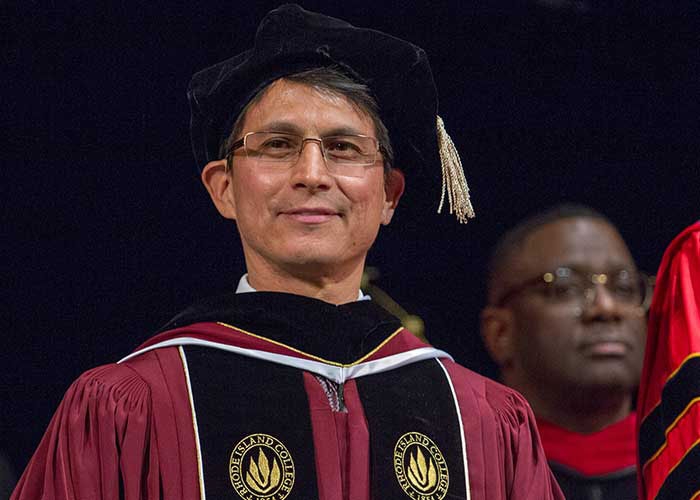
He saw unlimited potential and unlimited opportunities for Rhode Island College, and he created an executive team who was on fire to carry out his vision. Sánchez launched a new Division of Student Success to improve the delivery of student services and programs, and a new Office of Diversity, Equity and Inclusion, with the mission to advance equity and social justice across the college. He carried out campus-wide modernizations of RIC’s infrastructure, repainting and refurnishing buildings; creating more communal, student-centered spaces; and generating an overall feeling of pride in the institution.
To the Greater Rhode Island community, Sánchez redefined the public narrative about Rhode Island College. He disliked the expression: “RIC is the best-kept secret in Rhode Island.” Rather he took every opportunity to boast about the fact that “more than 70 percent of Rhode Island College graduates live, work and raise their families in Rhode Island” and that we are a pipeline for “servants of the state who power the state’s economy”; “we serve all Rhode Islanders, regardless of their income, background or station in life”; and “we are the “highest quality, most affordable four-year institution in the state.”
Sánchez was one of the college’s greatest champions, and like the presidents before him, he was a catalyst for the college’s continued evolution.
In this Q&A, Sánchez reflects on his time in office and weighs in on questions of RIC’s future.
You’ve done more to diversify Rhode Island College than any other president. What accomplishments in this area are you most proud of?
Becoming the first institution in Rhode Island to earn federal Hispanic Serving Institution status was a major accomplishment. That designation makes us eligible to apply for additional federal funding to expand educational opportunities for Hispanic/Latinx students.

I’m proud of the fact that we’ve seen a dramatic increase in the overall diversity of our student population from 29.7 percent in 2016, when I took office, to 38.6 percent in 2021. I think communities of color have begun to see Rhode Island College as a first-choice institution. We’re reaching communities that may have not been served before, and, in doing so, we’re serving the state.
I’m also proud of the establishment of the Office of Diversity, Equity and Inclusion and the diversification of the executive team. Before I took office, there was no racial diversity on the executive team. During my tenure, 45 percent of the executive team were people of color and 55 percent women. You need good executives to drive the equity and inclusion priorities forward, and I think it always helps to have that diversity at the highest level of the institution.
What are some of the other highlights of your tenure?
In terms of overall accomplishments, I’m proud to have worked with the RIC Foundation to make a case for investing in human resources to increase fundraising and philanthropy. With the help of the RIC Foundation, we purchased Blackbaud, a state-of-the-art donor management system, which allowed us to identify potential donors that we didn’t know we had. As a result, we’ve increased annual giving by 200 percent.
In addition, our entire endowment has grown from about $26 million to about $43 million. Over the last 18 months, we’ve secured the largest and third largest gifts in the history of the college. That tradition and culture of giving has really picked up momentum and it’s going to help sustain the institution in the long run and ensure its viability.
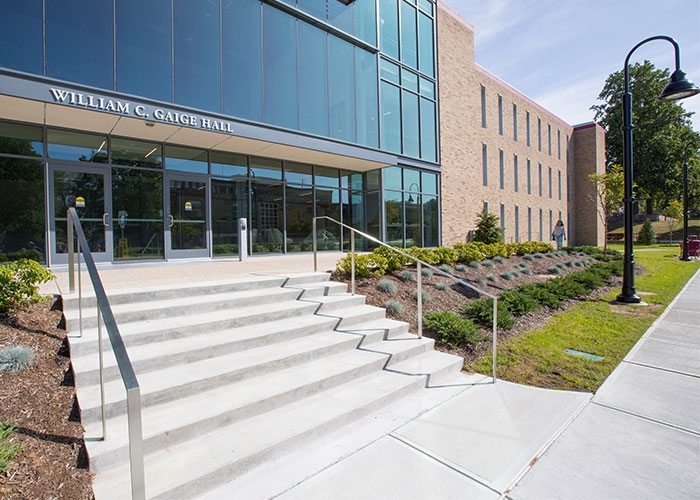
Another great accomplishment was completing about $62 million in capital construction over the last six years from a 2012 bond that was led by former RIC President Nancy Carriuolo. The bond covered renovations and additions to Gaige Hall, Craig-Lee Hall and the Fogarty Life Science Nursing Wing.
In 2018 we secured a $25 million bond to modernize Horace Mann, our teacher education facility, which will be open this fall. In 2021 we secured a $38 million bond for Clarke Science, which houses the Department of Physical Sciences. And currently in the governor’s budget is an additional $35 million to create a student services one-stop-shop center on campus for students. Instead of having services in different buildings on campus, we will be able to centralize many of the core services for students. It will put an end to the “RIC runaround” and help with retention and student success. That’s pretty exciting.
Students have been at the center of everything you do. There’s a group selfie you took at the start of your presidency, surrounded by students in the lobby of Roberts Hall, which is indicative of where your heart is. What inspires you about students?
It’s similar to what inspires me about our alumni. As I talk to our alumni, I hear how deeply committed they are to bettering their lives and the lives of their family. They just want the opportunity to realize their dreams. Even if it takes a little longer, they’re willing do whatever they need to do to earn their degree. You can’t help but get energized about students who come from modest means and who are oftentimes first in their family to get a college education. To see them realize their talents and make a difference in the world is the most exciting part of education. That’s what this institution did for our alumni through great mentoring, instruction, coaching and advising.
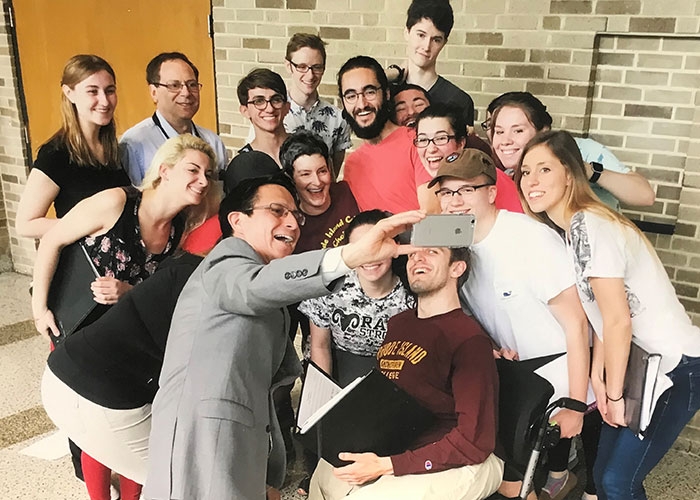
I also came from Student Affairs [serving as vice chancellor for student affairs at the City University of New York and as vice president for student affairs at Adams State College], so I’ve always been student-guided, student-driven and student-focused. But here at Rhode Island College, I had the opportunity to think about how to design and modernize an institution to help students succeed. It has everything to do with new facilities, new technologies, the services we provide, fundraising and building relationships with the legislature who ultimately fund you.
What is the greatest challenge facing Rhode Island College today?
The greatest challenge is going to be moving the dial from what we’ve always done to new ways of thinking about delivering our mission and preserving the quality and excellence that makes up the institution. Our strength as an institution is high-touch – the mentoring, coaching, face-to-face caring for students who are right in front of us. That’s our strength. But as we deliver online and hybrid learning, how do we balance the high-touch with high-tech? You have to have both today.
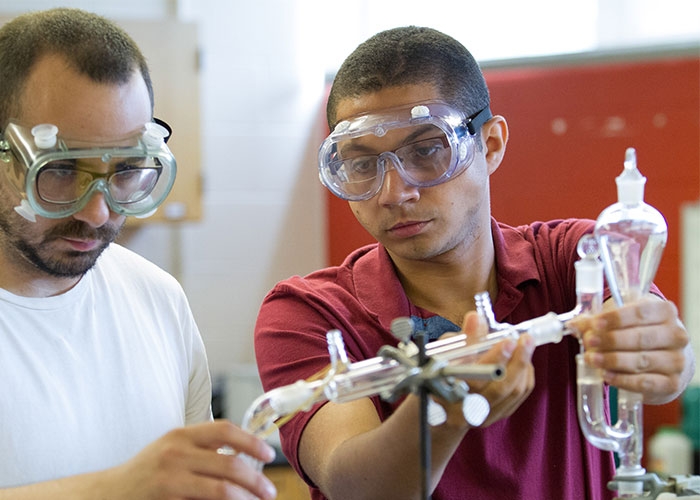
Research shows that as much as 25 to 30 percent of all students take at least one online course at many of our peer institutions. I would recommend that we offer 20 to 25 percent online availability, or maybe even as high as 30 percent.
You’ve also been a proponent of developing apps and other technology for students to easily access services on campus.
The world is changing and we have to prepare for the fact that students’ needs are going to change. The Gen Alphas are going to be on our campus in about five years. They’ve grown up their entire life with smart technology, where they can order services verbally and request music instantaneously. Unless institutions automate all of their systems to make it easy to engage with students, then students are going to go elsewhere. We have to be ready for that generation, because they’re not going to want to wait in long lines for services.
For years, people have said that Rhode Island College will eventually merge with URI and disappear. How do you respond to that?
I think they have to be clear about what makes Rhode Island College distinctive from URI. We have a critical role to play in the state. We serve Rhode Islanders who need access to high-quality, affordable degrees. There are 120,000 Rhode Islanders with some college credit and no pathway to finish their degree. Our mission is to serve them and the changing demographic of Rhode Island. URI has a different mission. They’re a research institution. About 60 percent of their freshman class are out of state. That’s not who we are. More than 70 percent of Rhode Island College graduates live, work and raise their families in Rhode Island. We have a focused mission.
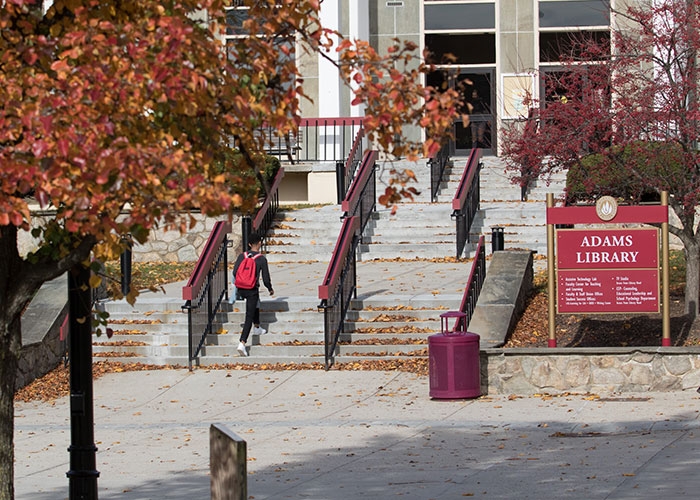
You’ve created a lot of changes at Rhode Island College. How has Rhode Island College changed you? What new insights have you gained?
I once read that “we don’t have good and bad days; we have days when we’re celebrating and days when we’re learning.” I’ve done a lot of learning over the last several years. New insights include the awareness that there is even greater potential than I originally imagined at this institution. When I see the depth of caring for students in our faculty and staff and their willingness to support students not only in earning a degree but in finding their strengths and passions, I realize there’s even greater potential at this institution than I originally thought.
What fascinates you about the future?
I’ve seen the ability of our campus to come together during very challenging times and the willingness of people to put their agendas and personal interests aside and really look at the best interests of the institution, whether its decisions around COVID, around the budget or around planning. We’re going to continue to evolve and it’s going to take that quality of selflessness and the ability for bright people to come together to chart that future together. If we can’t leverage a shared governance approach and a shared approach to that future, some people will get there but some people won’t.

What are some fond memories you will carry with you about living in the state of Rhode Island?
Of course, there’s Newport’s Cliff Walk, WaterFire, the good food and restaurants and the growing diversity of the residents of the state. But, for me, it’s just the breadth and depth that this institution has had in Rhode Island and how it has touched so many Rhode Islanders in some form or fashion, whether it’s their immediate family or extended family. Rhode Island College has been a part of so many people’s lives. That realization is pretty special to me and the fact that I had the chance to be a part of this institution and serve this state well.
Change in leadership is always difficult. The hope is that no matter what seismic changes Rhode Island College faces, we’re still expanding and evolving. Is that how you look at it?
Yes, people evolve. Spaces evolve. Environments and societies evolve. Life is always moving forward. Sometimes it takes a drastic change for the future to emerge. Sometimes things have to contract in order to expand. And so, this is just one inflection point in the evolution of Rhode Island College. The next person gets to build on its evolution and take it forward.
